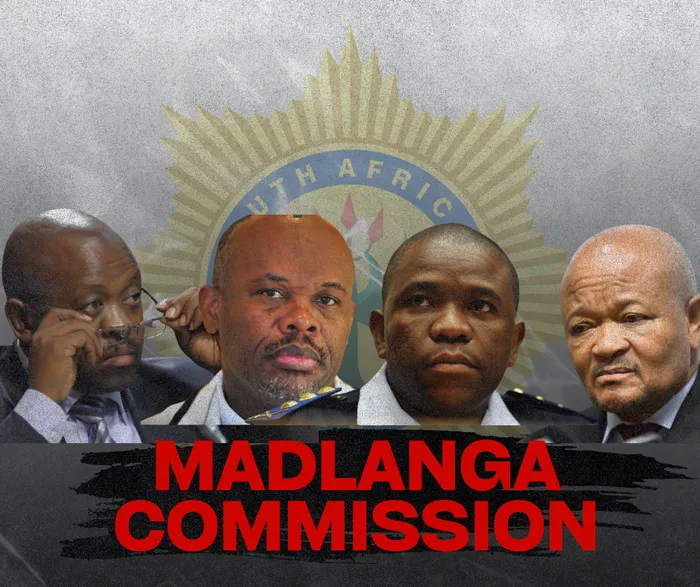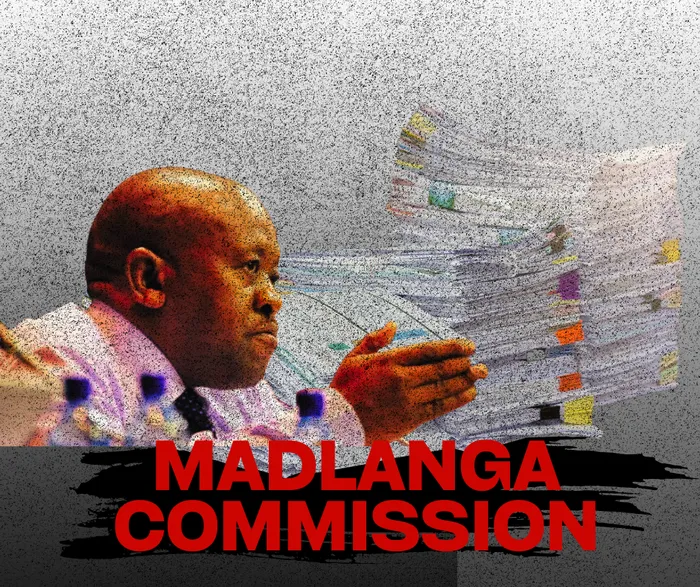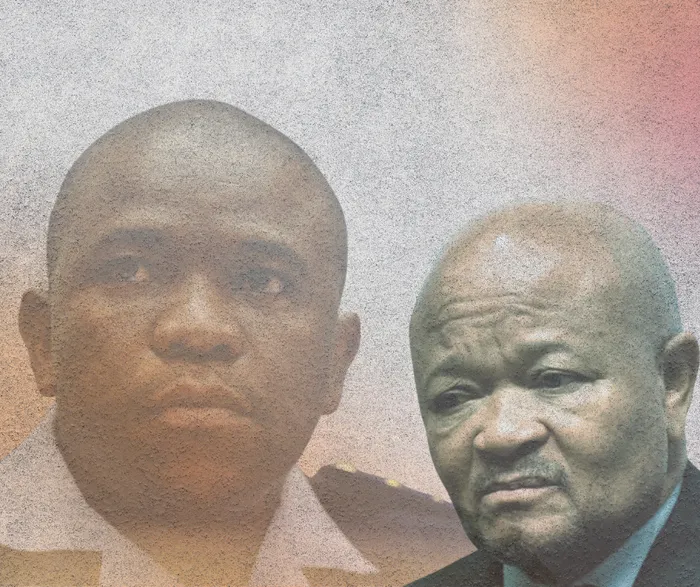
In the spotlight: Justice Madlanga, Police Minister Senzo Mchunu, Deputy Commissioner Shadrack Sibiya and KZN Commissioner Nhlanhla Mkhwanazi — as the R147.9m Madlanga Commission into SAPS corruption kicks off this week
Image: IOL Graphics
The day has finally come. KwaZulu-Natal provincial police commissioner Lt-Gen Nhlanhla Mkhwanazi is set to lay bare the corruption, political interference, and shielding of criminal networks within the South African Police Service (SAPS).
No one expected the day to come this quickly, but this is D-Day.
What was expected to be a normal media briefing has instead shaken the country and left many with unanswered questions.
Now, the Judicial Commission of Inquiry into Criminality, Political Interference, and Corruption in the Criminal Justice System, chaired by retired Constitutional Court Justice Mbuyiseli Madlanga, is set to take centre stage.
Mkhwanazi is expected to lift the lid on a scandal that has rocked SAPS, a service already struggling to combat rampant crime.
It all began on July 6, when Mkhwanazi, known for his no-nonsense approach to policing, stunned the nation with an explosive media briefing.
Dressed in Special Task Force (STF) camouflage, flanked by heavily armed officers from STF and Tactical Response Team (TRT) units, Mkhwanazi declared he was in “combat mode” and ready to die for the badge.

South Africa has been here before—shiny commissions, thick reports, bold promises. Now, the Madlanga Commission faces the same question that haunts all its predecessors: will justice finally be done, or will it be yet another smokescreen?
Image: IOL Graphics
He made serious allegations against Police Minister Senzo Mchunu and Deputy National Commissioner Lt-Gen Shadrack Sibiya.
Mkhwanazi accused Mchunu of alleged political interference, including his role in shutting down a task team investigating political killings.
He alleged cellphone analysis had linked one of Mchunu’s associates to the criminal underworld.
He made it clear: his boss was the National Police Commissioner General Fannie Masemola, not the minister, and said Mchunu had no authority to close policing units.
“We are in combat mode. I am taking on the criminals directly… I am a police officer who understood the task at hand when I joined the service. I chose the combating side of policing. I understand that the war we are fighting involves high-level officers,” said Mkhwanazi.
Mkhwanazi alleged that in March, 121 case dockets were removed without authorisation from the task team and shelved at Sibiya’s office in Pretoria.
He claimed this was done on Sibiya’s orders, allegedly under Mchunu’s direction.
“Five of these dockets had instructions to arrest perpetrators, but nothing has been done. They are sitting in an archive in Pretoria - God knows why,” he said.
He claimed the now-disbanded unit had uncovered links between a national criminal syndicate and senior politicians, police officers, and prosecutors - which may have triggered a coordinated effort to halt its work.
“I can confirm to South Africans today that this investigation uncovered a syndicate. It involves politicians currently serving in Parliament,” he said.
Mkhwanazi also accused Mchunu of misleading Parliament about his relationship with Brown Mokgotsi, an associate allegedly granted access to confidential SAPS documents and internal discussions - including those related to disbanding the task team.
“The Minister denied knowing Mr Brown Mokgotsi in Parliament but later confirmed on a public platform that he is his comrade from the North West,” Mkhwanazi said.
The Political Killings Task Team was formed in 2018 as a multi-agency unit involving SAPS, the National Prosecuting Authority, State Security, and Correctional Services.
It focuses on politically motivated killings in KwaZulu-Natal. The dockets have since been returned to the province.
On December 31, 2024, Mchunu wrote to National Commissioner Masemola requesting the disbandment of the team.
Mchunu argued that the team had “outlived its usefulness.”
Mkhwanazi, however, claimed the unit was formally shut down in March, just as it was investigating links to a powerful drug cartel and senior political figures.
He presented WhatsApp messages, SAPS documents, and cellphone records that, he said, showed a deliberate attempt to dismantle the team and protect criminal networks.
Among those implicated were businessman Vuzimusi “Cat” Matlala, arrested for attempted murder, and Brown Mokgotsi.
According to Mkhwanazi, Matlala received a R360 million SAPS contract in 2024 and had allegedly been funding Mchunu’s political activities, along with Mogotsi. The contract was later scrapped.
He also accused senior officers of stalling investigations into the murders of prominent entertainment figures, alleging their involvement in or protection of drug cartels.
In March, during a briefing to Parliament’s Portfolio Committee on Police, Mkhwanazi revealed messages sent to him by Mokgotsi. Mchunu and Masemola were present at the same meeting.
Mchunu initially denied knowing Mokgotsi, but later admitted to knowing him “as a comrade” - not as an informant.
While Mchunu has said he is willing to testify and clear his name, so has Mokgotsi.

Lt-Gen Nhlanhla Mkhwanazi is expected to deliver explosive testimony as the Judicial Commission of Inquiry into Criminality, Political Interference, and Corruption in the Criminal Justice System begins on Wednesday.
Image: IOL Graphics
Masemola has indicated he too is willing to testify if called. Mkhwanazi’s allegations sparked national outrage.
President Cyril Ramaphosa responded by placing Mchunu on paid leave and appointing Professor Firoz Cachalia as acting police minister.
Ramaphosa also announced the formation of a Judicial Commission of Inquiry to investigate the claims.
The commission’s first public hearing is scheduled for Wednesday at 10 a.m at the Bridgette Mabandla Justice College in Pretoria. Mkhwanazi is expected to be the first witness.
Subsequent hearings will begin daily at 9.30 a.m, according to Commission spokesperson Jeremy Michaels.
The taxpayer is footing a R147.9 million bill for the commission across the 2025 and 2026 financial years.
The key question remains on whether this be money well spent or just another costly report destined to gather dust?
Concerns have been raised about how the funds will be managed, who will be contracted, and whether the inquiry will lead to meaningful reform.
Many political parties have questioned whether such commissions are effective - and if their outcomes ever justify their cost.
simon.majadibodu@iol.co.za
IOL Politics